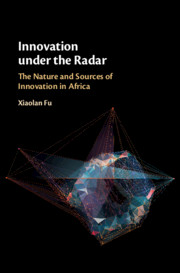Book contents
- Innovation under the Radar
- Innovation under the Radar
- Copyright page
- Dedication
- Contents
- Figures
- Tables
- Foreword
- Acknowledgements
- 1 Introduction
- 2 Innovation in Low-Income Countries
- 3 The Economy of Ghana and Tanzania
- Part I The Nature and Domestic Sources of Innovation in Africa
- Part II The Diffusion of Foreign Innovation into Africa
- Part III Emerging Technologies and Innovation in Africa
- Book part
- References
- Index
2 - Innovation in Low-Income Countries
Received Wisdom
Published online by Cambridge University Press: 27 November 2020
- Innovation under the Radar
- Innovation under the Radar
- Copyright page
- Dedication
- Contents
- Figures
- Tables
- Foreword
- Acknowledgements
- 1 Introduction
- 2 Innovation in Low-Income Countries
- 3 The Economy of Ghana and Tanzania
- Part I The Nature and Domestic Sources of Innovation in Africa
- Part II The Diffusion of Foreign Innovation into Africa
- Part III Emerging Technologies and Innovation in Africa
- Book part
- References
- Index
Summary
While literature on innovation and the diffusion of innovation in developing countries has grown over the years, the evidence remains inconclusive. This chapter employs a systematic review protocol to examine and shed light on the factors that influence the creation and diffusion of innovations as well as the internal and external channels of innovation diffusion in low-income countries. The evidence suggests that the literature is still nascent, with most of the studies published only in the last five years. While factors such as clusters, the link between public (universities) and private sector, and the empowerment of the poor are key facilitators of knowledge diffusion, other factors including weak education systems, unstable political powers, fragile legal systems, limited financial resources, poor infrastructure, and cultural and linguistic distances all hamper the diffusion of innovations in low-income countries. These enhancing and hampering factors were, however, identified to be heterogeneous and vary from one developing country to the other. With research gaps in areas such as the determinants of innovation diffusion in the informal sector and the role of open innovation networks in LIC, among others, it is recommended that low-income countries must focus attention and resources on measuring and capturing incremental innovations and innovation activities in formal and informal settings.
- Type
- Chapter
- Information
- Innovation under the RadarThe Nature and Sources of Innovation in Africa, pp. 16 - 42Publisher: Cambridge University PressPrint publication year: 2020

